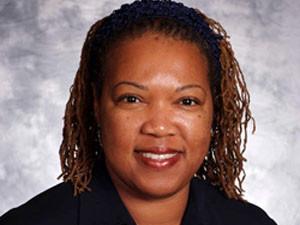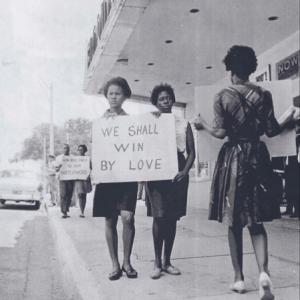
Rev. Dr. Stephanie Buckhanon Crowder, an ordained Baptist and Disciples of Christ minister, teaches New Testament at Belmont University. She earned a Bachelor of Science degree summa cum laude in Speech Pathology/Audiology from Howard University; a Master of Divinity degree from United Theological Seminary, and Master of Arts and Ph.D. degrees in Religion from Vanderbilt University.
Dr. Crowder was a Fund for Theological Education Dissertation Fellow, Wabash Center for Teaching Fellow and Louisville Institute Summer Grant recipient. She has contributed to numerous publications including The Chalice Introduction to the New Testament, True to Our Native Land: An African American New Testament Commentary, and The African American Lectionary. Her work on womanist maternal thought can be found in Semeia Studies: Biblical Mothers and Their Children. She is on the Editorial Board of Feasting on the Gospels.
Dr. Crowder is married and has two sons.
Posts By This Author
More Than the Eye Can See
"We do not see things as they are. We see things as we are.” This Talmudic quote from Rabbi Shemuel ben Nachmani notes that seeing is not always vision. What we see in life is more than what the eye beholds. A person or circumstances right in front of us can be merely the surface of someone or something more profound.
The United States must forever recall the struggles, moves, and marching of the women and men across the Edmund Pettus Bridge. Fifty years ago, ordinary people walked for the right to stand up and be counted. To the naked eye, those sojourners lacked political clout as much as they did fiscal wherewithal. Those citizens were not persons of means, but their intentions were good. They meant well. They meant to do whatever — to get the right to vote.
No whips, dogs, horses, or hoses would stifle their efforts. The Americans who marched from Selma to Montgomery may not have looked like much, but their actions changed this country’s political horizon and racial landscape. Yes, a yearning in their loins propelled them to create social change. They were going to vote at any cost, at any price.
In this week’s lectionary passage, a man crippled from birth wanted “change.” Actually, he wanted coins or any alms that Peter and John could offer (Acts 3:1-11). To this man, the two disciples were in better shape than he was. From his view, he could surely benefit from whatever they had to offer. Yet, Peter exposes their impecunious state: “Look on us. We don’t have a nickel to our names.”
There was nothing spectacular or dazzling about Peter or John.
What’s So 'Domestic' About Violence?
I carry a purple purse. I actually bought it three years ago to treat myself to something new. Many women have complimented it, honestly to my surprise. Not that the purse is atrocious, but it does not carry a Gucci, Michael Kors, Coach, Chanel or any other label. It is just a purple purse that fits me and holds my essentials, and sometimes those of my children. Until recently I had not given any second thought to having a purse the color of Barney. Sorry I could not resist.
While reading all of the commentary about professional athletes and abuse, as if they are the only people who offend, I came across a public service announcement for the Purple Purse Campaign. What an a-ha moment. Finally someone gets it. It is one thing to give all of the stats blasting that one out of four women experience domestic violence or that twenty people per minute, men and women, are victims of physical violence at the hands of an intimate partner. It is astoundingly painful to know an estimated three women die each day because a “loved one” could not control himself. The facts are. The truth is.
However, as the Purple Purse Campaign purports, domestic violence is also withholding money or limiting financial freedom. It is verbal assault. Domestic violence is hindering access to family and social circles. Intimacy partner violence involves humiliating the victim. It is harassing people via social media, texting, phone calls or emails. Domestic violence or intimate partner violence can be a physical, mental, financial, emotional, sexual or psychological act. In other words, domestic violence is bullying.
Do You Know How to Two Step?
50 years later, poverty is still an issue in America.
I cannot say I am the greatest dancer. I enjoy all types of music. The rhythms of my eclectic taste often entice me to move. Naturally, I easily find myself swaying this way or that way. My feet are not far behind. Only sheer foolishness would compel me to compare my dancing with grace and gifts of Beyonce, Tina Turner, or any champion from Dancing With the Stars. I know my limits. That’s one of the first steps to being successful: know what you can and cannot do.
I can do the basic two-step. A step to the right. A step to the left. A step up. A step back. I do not have to think about it. Just a simple one-two, one-two, and the sounds tickling my ears manifest in my feet. There is no harm if all I do song-in and song-out is slide to right, shimmy to left, take it to top and prance it back. A simple motion of one foot forward and one foot backward, and I am at peace relishing in the music of the moment.
Go Ahead and Die Already
Society has an affinity for death. There is a pervasive fascination with (im)mortality. We appreciate life, but we are seduced at the intricacies and unknowns of death. While there is much enjoyment and celebration over health, personal accomplishments, births, and birthdays, women and men around the world ponder the “what ifs” concerning the end of life. The thought of death grips us with a “thanatopsis” like inquisitiveness — no fear just sheer curiosity.
Look at the ubiquitous commentary on demise and dying. The Walking Dead has become one of the most highly watched shows. Along with True Blood, Cold Case, and Resurrection television is replete with musings over death and what happens when the “dead” come back to life. Don Piper’s 90 Minutes in Heaven and the book-turned-film Heaven is for Real challenge us to discard any sense of reason or rationale when it comes to what many of us living have not experienced personally — that is dying. Yes, we have gone to funerals, but dare I say we were not in the casket.
A New Way of Being 'Pro-Choice'
“I knew from the beginning that as a woman, an older woman, in a group of ministers who are accustomed to having women largely as supporters, there was no place for me to come into a leadership role. The competition wasn’t worth it.”
These are the words Ella Baker spoke regarding her decision to leave the Southern Christian Leadership Conference, SCLC, in 1958. Baker was one of the core founders of this organization. Yet, her male colleagues only recognized her competence and expertise to a limit. The “preacher’s club” selected Rev. Wyatt Tee Walker to replace Baker at the helm. Due to this prevailing patriarchy and what she deemed a focus on “mass rallies and grand exhortations by ministers without follow-up,” Baker left the SCLC. She chose to go her own womanly way.
We make decisions every day. Life’s twenty-four-hour cycle is filled with choices. We contemplate what we will wear. We ponder breakfast selections. Will it be the bagel with cream cheese or a caramel macchiato with soy? Should I watch Mad Men, Scandal, or go to bed early? Do I call or just send a text or email? Our daily lives are replete with routine choices.
However, beyond these commonplace decisions are those personal, communal, and national selections that will have an impact on our lives years from now.
On Scripture: Beaten, Battered, and Burned Before I Am Helped
As the proliferation of pink points to October as Breast Cancer Awareness Month, shades of purple warn us not to forget Domestic Violence Awareness. The story in the Gospel of Luke sheds light on what tenacity, in any form, can accomplish. The widow did not cease in her efforts. Someone had wronged her; and she wanted the situation to be made right. We must be equally diligent in our determination to obliterate domestic violence. We must not become comfortable with reporting abuse after the fact. Our judicial officials, police personnel, school counselors, religious institutions to name a few, must take even the slightest whisper of harm seriously. We must not succumb to the foolish reasoning that “snitching” will put more African American men in prison. If we keep talking, teaching, sharing, and behaving as good stewards of God’s creation, there is nothing or no one to prevent us from getting a handle on domestic violence — and not putting an abusive hand on each other.
Survivors of domestic violence cope in many ways. Some engage in substance abuse while others tend to “over-spiritualize” their experiences. My mother chose to commit suicide to deal with her pain. Today, Yvette Cade travels the country speaking about her life. She is on the mend physically, but she is still afraid. Nonetheless, through her fear, she lifts her voice. Not one more person should have be battered or bruised before someone dares to help. Before we dare to help.
On Scripture: Fighting for Freedom
“If you love somebody, set them free. Free. Free. Set them free.” Of all the songs to come to mind during this Independence Day weekend, this one rings in my head. Sting, the artist, did not have America’s freedom celebration in mind when he coined these words. Honestly, the song has little to do with patriotism; it is more of a ballad of love lost and letting go. Nonetheless I dare to invoke it, as the words resonate with the spirit of autonomy that is so pervasive on July 4. “Set them free. Free. Free. Set them free.”
Each year at this time, our country focuses on liberty, the red-white-and-blue, and “My Country Tis of Thee.” I am grateful to live in the U.S. and the freedom this affords. Yet, what about persons who are not so independent — the unemployed who rely on federal subsidies, children whose schools are closing due to no fault of their own, and yes, the millions of Americans in the prison system? Although the Fair Sentencing Act of 2010 reversed the disparity between crack and cocaine convictions implemented by the Anti-Drug Abuse Act of 1986, the prison rate remains exorbitant. More than 2.2 million are still behind bars. The Texas execution rate is at 500 and counting. Forty-eight percent of persons in federal prisons were convicted of drug offenses, according to The Sentencing Project. A reversal in policy three years ago has not flipped today’s prison numbers. So many are not free.
On Scripture: We'll Walk Hand in Hand?
"The old avocations by which colored men obtained a livelihood are rapidly, unceasingly and inevitably passing into other hands; every hour sees the black man elbowed out of employment by some newly arrived emigrant, whose hunger and whose color are thought to give him a better title to the place."
-Frederick Douglass
“Learn Trades or Starve” (1853)
The Obama Administration and a bipartisan group in the Senate are making serious turns to tackle immigration reform. In addition to declaring that as citizens “our rights are wrapped up in the rights of others,” the president’s State of the Union address spoke of securing borders and decreasing the wait timeframe for the American residential legalizing process. Some 12 million women, men, and children across these United States await with bated breath to see what political deals will be made to construct either a pathway to citizenship or pave a road to deportation hell.
What is intriguing about the immigration conversation is that pundits tend to frame the argument in an "Us-versus-Them" fashion. Using rhetorical scare tactics, proponents for and against are not shy about disrobing a “more of them means less for us” stratagem. While much of this ploy has centered on how the massive number of “non-citizens” will subtract resources from persons of European descent, there is now a political stream that avers even sending “border breakers” to the back of the citizenship line will still reduce jobs among African-American low-wage earners. Words from Booker T. Washington, W.E.B DuBois, A. Philip Randolph, and the quote from Frederick Douglass, among many others, are now resurfacing as a clarion call for African-Americans to think long and hard about getting on the “brown” bandwagon. Yet, none of the language from the aforementioned historical figures specially addresses Latino immigration.






